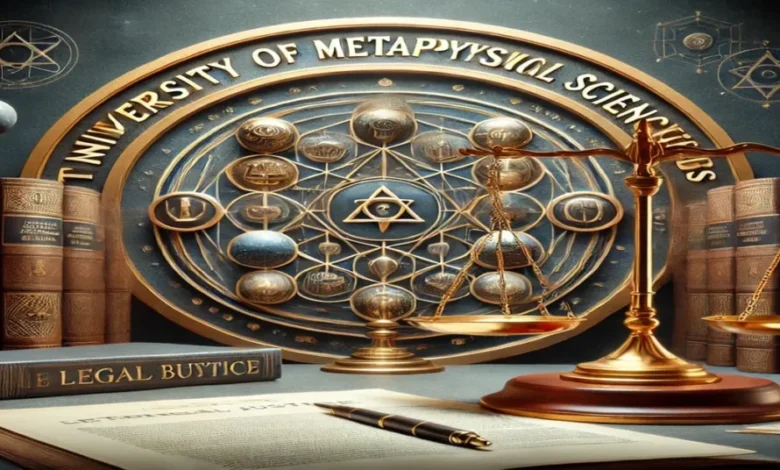University of Metaphysical Sciences Lawsuit: An In-Depth Analysis

Introduction to the University of Metaphysical Sciences Lawsuit
The University of Metaphysical Sciences Lawsuit (UMS) is an accredited institution dedicated to offering degree programs in metaphysical studies, promoting personal and spiritual development through its unique curriculum. Founded with the mission of providing accessible education in fields such as spirituality, intuitive arts, and holistic healing, UMS aims to empower individuals to explore and broaden their understanding of metaphysical concepts. The university engages with students who seek knowledge beyond traditional educational frameworks, fostering a community of like-minded individuals passionate about metaphysical practices.
Recently, the university has been the focus of a lawsuit that draws attention to various legal and ethical considerations within the realm of higher education and metaphysical studies. This lawsuit has significant implications not only for UMS but also for other institutions offering similar programs. The case has emerged against a backdrop of rising interest in alternative education models, prompting a broader discussion about the legitimacy and regulation of metaphysical courses and degrees. Concerns regarding consumer protection, transparency, and accreditation in niche educational sectors are pivotal themes in this legal dispute.
The nature of the lawsuit involves allegations related to the university’s operational practices, potentially questioning the validity of its programs and the value of its educational offerings. As the legal proceedings unfold, essential questions arise regarding the role of metaphysical sciences in academia, creating a ripple effect that may influence other institutions in the same field. Understanding the intricacies of the university of metaphysical sciences lawsuit requires examining the details and implications of the case, as well as its potential impact on students and educators alike.
Background of the University of Metaphysical Sciences
The University of Metaphysical Sciences (UMS) was established with the intention of providing a unique educational experience centered around metaphysical studies. Founded in the early 1990s, it emerged as an innovative institution dedicated to exploring the relationships between consciousness, spirituality, and holistic practices. The university’s founders envisioned a place where individuals seeking deeper knowledge and understanding of metaphysical concepts could pursue their interests through formal education.
UMS offers a range of programs aimed at various levels of spiritual and metaphysical education. These include degree programs in metaphysical sciences, spiritual counseling, and holistic healing. The target audience primarily consists of individuals who are interested in personal development, spiritual growth, and alternative healing methodologies. By providing such specialized programs, the university caters to a diverse student body eager to expand their understanding of metaphysical principles and their applications in everyday life.
Throughout its history, the University of Metaphysical Sciences has faced a variety of challenges and controversies that have shaped its trajectory. One notable area of discussion revolves around the legitimacy and accreditation of its programs compared to traditional educational institutions. Critics have questioned the value of its degrees and the university’s standing within the academic community. Nevertheless, UMS has continuously worked to establish its credentials and has achieved recognition from several alternative educational associations, thus validating its mission and programs.
As the university developed, it garnered a following and amassed a collection of notable achievements, including published works by faculty members and contributions to the metaphysical community through workshops and seminars. However, recent developments have brought the university into the spotlight due to the ongoing university of metaphysical sciences lawsuit, which brings forth questions regarding its operational practices and the implications for its future.
Details of the Lawsuit: What Led to the Legal Dispute?
The university of metaphysical sciences lawsuit arose from a series of incidents that sparked significant tension between the institution and several of its former students. The legal dispute was initiated when a group of students filed a class-action lawsuit against the university, alleging deceptive practices regarding the nature and quality of the academic programs offered. This lawsuit claimed that students were misled about the credentials and qualifications needed to receive their degrees, which were purported to be recognized within the metaphysical community. Furthermore, they argued that the university did not provide adequate educational resources or support, leaving many students feeling unprepared for their future endeavors.
A timeline of events leading to the lawsuit reveals key incidents that contributed to the plaintiffs’ grievances. Over the past few years, several students raised concerns about the curriculum and its alignment with industry standards. In early 2022, a critical meeting occurred between university representatives and concerned students, where students presented their complaints regarding both the educational content and administrative practices. Following this meeting, a lack of substantial changes prompted students to take action, culminating in the formal filing of the lawsuit in mid-2023.
The claims made in the university of metaphysical sciences lawsuit also pointed to unfulfilled promises about job placement support and mentorship opportunities. Plaintiffs asserted that the institution’s marketing materials suggested a strong network of professional connections that were not evident during their time at the university. The combination of these factors ultimately led to heightened dissatisfaction among students, compelling them to seek legal recourse to address their grievances and hold the university accountable for the alleged discrepancies in its operations.
Key Stakeholders Involved in the Lawsuit
The lawsuit involving the University of Metaphysical Sciences has garnered attention from various parties, each with their own interests and stakes in the outcome. Primarily, the plaintiffs consist of former students who have raised concerns about the university’s practices regarding educational quality and financial transparency. These students argue that they were misled by the institution regarding the value and legitimacy of the degrees awarded, which has positioned them as central figures in this legal dispute. Their collective experiences underline the necessity for accountability in educational institutions, particularly in the realm of alternative education.
On the opposing side, the university stands as the defendant in this case. It contends that it has maintained appropriate educational standards and adhered to regulatory requirements, asserting that the allegations brought forward by the plaintiffs are unfounded. The university’s administration emphasizes its commitment to providing quality education in the metaphysical sciences, framing the lawsuit as an attack on its reputation and mission. They argue that the complaints stem from a misunderstanding of the institution’s teachings and the nature of the programs offered.
Moreover, third parties such as regulatory bodies and educational associations may have a vested interest in the outcome of the university of metaphysical sciences lawsuit. These organizations often seek to uphold standards within the educational landscape and may influence the case’s direction based on their findings and regulations. They play a crucial role in assessing the legitimacy and operational practices of institutions like the University of Metaphysical Sciences, ultimately impacting future regulatory frameworks and public trust in alternative educational entities.
Legal Implications and Challenges
The University of Metaphysical Sciences lawsuit brings to the forefront several legal implications and challenges that are significant for both the institution and the educational landscape it represents. As the case progresses, various laws and regulations governing educational institutions may influence the proceedings, making it imperative to examine the context in which the lawsuit is occurring.
The primary legal considerations include whether the university has adhered to state and federal educational standards pertinent to its operations. These standards encompass accreditation, financial transparency, and the ethical treatment of students. Breaches in these areas could potentially result in severe regulatory penalties, impacting the university’s reputation and ability to operate. As this lawsuit unfolds, precedents from similar cases will likely be examined to gauge potential outcomes. For instance, institutions that have faced lawsuits regarding accreditation often encountered challenges that not only questioned their legitimacy but also prompted significant changes in their operational conduct.
Moreover, the university may confront challenges related to public perception and the implications of reputational harm associated with ongoing litigation. Legal disputes can engender skepticism among prospective students, faculty, and financial supporters, which further complicates the university’s position in an already competitive market of alternative educational institutions. As past cases suggest, institutions that proactively engage with their stakeholders during litigation often fare better in mitigating negative repercussions.
Ultimately, navigating the complexities of the University of Metaphysical Sciences lawsuit will require a strategic approach that considers both legal and reputational factors. The outcomes of this case could set precedents for how similar institutions handle legal challenges in the future, shaping the regulatory landscape for the field of metaphysical education. Understanding these dynamics will be critical for stakeholders as they observe the unfolding events related to this high-profile lawsuit.
Public and Community Reactions to the Lawsuit
The University of Metaphysical Sciences lawsuit has generated considerable attention, eliciting a broad spectrum of reactions from various stakeholders, including students, alumni, faculty, and community members. The diverse opinions reflect differing views on the implications of this legal battle for the institution’s reputation and future.
Students currently enrolled at the university have expressed mixed feelings about the lawsuit. While some are concerned about potential disruptions to their education and the university’s stability, others believe that the allegations may prompt necessary changes for improved governance and transparency. Many students see the lawsuit as an opportunity for the institution to clarify its stance on key issues and reinforce its commitment to academic integrity.
Alumni reactions are equally varied. Some former students worry that the lawsuit could tarnish the legacy of their alma mater, potentially impacting the value of their degrees. Meanwhile, others support the notion that accountability is essential for the advancement of the university’s mission and vision. This division reflects the deeper complexities surrounding perceptions of metaphysical education and its standing within broader academic circles.
Faculty members have also weighed in, with some expressing concern over job security and the potential financial ramifications of the lawsuit. Conversely, several educators acknowledge the necessity of addressing the issues at hand and view the lawsuit as an impetus for positive reform. They hope that the public scrutiny will lead to a thorough examination of policies, ultimately benefiting the academic community.
Community members have not remained silent either, as local businesses and residents share their perspectives. Some believe that the lawsuit could cast a shadow over the community’s connection to the university, while others argue that the university’s approach to resolving the issues at stake will determine its long-term impact on community relations. Overall, the university of metaphysical sciences lawsuit has sparked meaningful dialogue across multiple platforms, indicating its significance beyond mere legal proceedings.
Current Status of the Lawsuit
The ongoing legal situation surrounding the University of Metaphysical Sciences lawsuit has seen several significant developments in recent months. As of October 2023, the case is still active, with multiple court sessions scheduled in the coming weeks. The university is embroiled in a series of allegations that challenge its operational practices and compliance with various educational standards. These claims have attracted both media attention and scrutiny from regulatory bodies.
Recently, a motion was filed by the plaintiff seeking a summary judgment, highlighting the university’s purported failures in its adherence to accreditation requirements. This motion has prompted the court to reevaluate the basis of the lawsuit, with an emphasis on the university’s accountability towards its students and faculty. The presiding judge is expected to deliver a ruling on this matter shortly, which could significantly impact the direction of the case.
Furthermore, legal representation for the university has undergone changes, with a new law firm taking the lead in defending the institution against the allegations. This shift aims to bolster the university’s legal strategy, as the previous counsel was perceived to be ineffective in addressing the emerging challenges within the lawsuit. The newly appointed attorneys have expressed confidence in navigating the complex legal terrain and are actively seeking to achieve a favorable outcome.
Meanwhile, both parties have engaged in discussions aimed at exploring potential settlement options. However, no formal agreement has been reached as of yet. The ongoing proceedings continue to develop, with both sides preparing for what could be a lengthy legal battle. The university’s commitment to upholding its academic integrity remains central to its defense in the lawsuit, as the institution strives to maintain its reputation amidst these challenges.
Potential Outcomes of the Lawsuit
The ongoing legal proceedings involving the University of Metaphysical Sciences generate considerable interest and concern among students, faculty, and stakeholders. Speculating on the potential outcomes of the university of metaphysical sciences lawsuit requires considering various scenarios that could unfold based on available evidence and historical precedents. One likely scenario involves a favorable ruling for the university, which would affirm its practices and operational legitimacy. Such an outcome could reinforce the institution’s reputation and restore confidence among current and prospective students, countering any negative perceptions stemming from the lawsuit.
Conversely, an unfavorable verdict could have profound repercussions. If the court rules against the University of Metaphysical Sciences, it may face financial penalties alongside reputational damage. This scenario could prompt a reevaluation of certain programs or policies, forcing the university to adapt to new legal standards. Additionally, stakeholders might express concern about the institution’s future stability, leading to potential decreases in enrollment and funding. It is crucial for the university to prepare for public relations strategies that effectively communicate their commitment to change, if necessary.
Another possibility involves a negotiated settlement, where both parties agree to terms outside the courtroom. Such an outcome could be beneficial for maintaining relationships and reducing lasting damage to the university’s brand. A settlement often allows both sides to avoid a protracted legal battle and public scrutiny, which can be advantageous in the long run. Overall, the potential outcomes of the university of metaphysical sciences lawsuit are varied, and each scenario carries implications for all stakeholders involved. Analyzing these possibilities will provide a more comprehensive understanding of the lawsuit’s impact as it progresses.
Conclusion: The Future of the University of Metaphysical Sciences
The ongoing university of metaphysical sciences lawsuit has raised significant questions regarding not only the institution’s operational legitimacy but also its place within the broader academic sphere. Throughout this blog post, we have examined various aspects of the situation, including the allegations made, the responses from the university administration, and the implications for its future. As the legal proceedings unfold, it is essential to consider how they may shape the landscape of metaphysical studies.
In light of the lawsuit, the university is likely to reassess its practices and policies to ensure compliance with educational standards. Such changes could include diversification of academic offerings and an increased emphasis on transparency. The institution’s ability to adapt to scrutiny will play a crucial role in retaining students and maintaining its reputation. As the metaphysical studies domain grows in popularity, institutions that focus on spiritual and holistic education must navigate legal challenges carefully to remain relevant.
Moreover, the outcomes of the university of metaphysical sciences lawsuit could serve as a precedent for other institutions operating in similar fields. If the court rules favorably for the plaintiffs, it may send a strong message regarding regulatory expectations for metaphysical education, potentially leading to tighter controls. Conversely, a ruling in favor of the university might validate current practices and bolster its standing. This legal battle, therefore, not only impacts the future of the University of Metaphysical Sciences but also the collective fate of metaphysical studies as an academic discipline.
In conclusion, the university of metaphysical sciences lawsuit represents a pivotal moment for the institution and the field as a whole. Stakeholders will undoubtedly be monitoring the developments closely, as they are likely to influence the future trajectory of metaphysical education and its integration into mainstream academia.
You May Also Read This UsabizPro.


